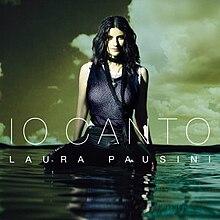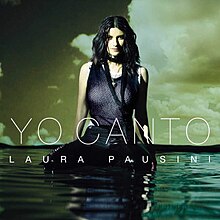| Io canto/Yo canto | ||||
|---|---|---|---|---|
 Italian-language edition | ||||
| Studio album by | ||||
| Released | November 10, 2006 (Italian-language) November 14, 2006 (Spanish-language) | |||
| Recorded | Logic Studio Milan, Italy Larione 10 Florence, Italy Henson Recording Studios Los Angeles, US Studio Impatto Bologna, Italy ORS (Oliveta Recording Studio) Castel Bolognese, Italy Sage Studio Los Angeles, US | |||
| Genre | Pop rock | |||
| Length | 68:07 | |||
| Language | Italian, French, Spanish | |||
| Label | Warner Music | |||
| Producer | Laura Pausini (also exec.), Celso Valli, Dado Parisini, Daniel Vuletic | |||
| Laura Pausini chronology | ||||
| ||||
| Alternative cover | ||||
 Spanish-language edition | ||||
| Singles from Io canto | ||||
| ||||
| Review scores | |
|---|---|
| Source | Rating |
| AllMusic | |
| Musica e dischi | |
Io canto and Yo canto (English: I Sing) are the ninth studio albums by Italian singer Laura Pausini. The Italian-language edition was released on November 10, 2006 while the Spanish-language edition was released on November 14, 2006 by Warner Music. Yo canto–Io canto is a limited-edition double album featuring both the Italian– and Spanish-language editions. This marks the first instance in Pausini's multilingual music career in which both editions are offered in a single release. Warner Music issued a third edition pressed exclusively for the French market. This pressing of Io canto features the bonus track "Je chante", a partial French adaptation of the Italian "Io canto".[6]
The album consists entirely of covers. Its repertoire spans three decades of Italian pop music history. Pausini pays homage to fellow Italian singer–songwriters whose lyrical work has influenced her artistic sensibility throughout the years.[7] In the album's liner notes Pausini reveals:
Here is the music I listen to when I'm at my saddest, or when I feel a moment is special, the songs I used to sing as a young girl when I first started performing, and above all, those which taught me to love music, and how music can move you so deeply, regardless of its genre or style.
Yo canto features "Dispárame, dispara", also known as "Corazón roto"—opening theme of the Mexican telenovela Amar sin límites (2006).[8] Chile's Canal 13 employed the album's title track for its television series Cantando por un sueño.[9] The album won the Latin Grammy in 2007 for Best Female Pop Vocal Album.
- ^ "Arriva "Io canto", il nuovo CD di Laura Pausini" (in Italian). Videoitalia.tv. 12 October 2006. Archived from the original on 13 June 2007. Retrieved 25 July 2011.
- ^ "Oggi i nuovi brani. Laura Pausini sexy per "Spaccacuore". A Vasco "Basta poco"" (in Italian). La Stampa. 19 January 2007. Archived from the original on 14 March 2012. Retrieved 25 July 2011.
- ^ "Non Me Lo So Spiegare – Da domani in radio il duetto Laura Pausini & Tiziano Ferro" (in Italian). MTV. 22 March 2007. Retrieved 25 July 2011.
- ^ "Yo Canto – Laura Pausini". AllMusic. Retrieved 25 July 2011.
- ^ Mario De Luigi (November 2006). "Laura Pausini – Io canto ****" (in Italian). Musica e dischi. Retrieved 25 July 2011.
- ^ "Laura Pausini editará su nuevo álbum, 'Yo canto', en español e italiano". los40.com. 10 November 2006.
- ^ "Laura Pausini canta a los clásicos de la canción italiana". Terra.com. 23 November 2006.
- ^ "Laura Pausini dice que canta". Terra.com.mx. 17 October 2006. Archived from the original on 16 November 2006. Retrieved 22 September 2007.
- ^ "Laura Pausini espera que en "Cantando por un sueño" no se compita por la fama". Cooperativa.cl. 10 May 2007.